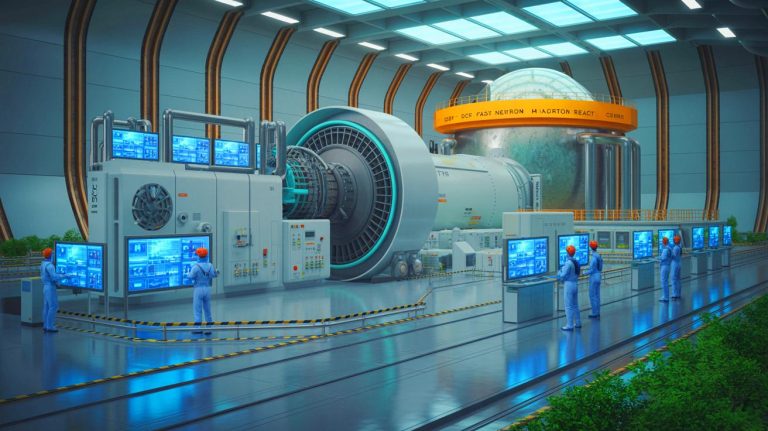| IN A NUTSHELL |
|
China’s introduction of the CFR-1000 reactor, a cutting-edge fast neutron nuclear reactor, signifies a pivotal advancement in nuclear energy technology. With the potential to produce up to 1.2 gigawatts of power, this reactor could supply electricity to nearly one million homes. As global energy demands increase and environmental concerns intensify, China’s technological strides in nuclear power could potentially reshape energy strategies worldwide. Set to become operational by 2034, pending regulatory approval, the CFR-1000 stands out as a commercial-scale unit. Unlike smaller experimental reactors, it is poised to play a crucial role in China’s future energy framework.
The Potential of Fast Neutron Reactors
The CFR-1000 belongs to a new class of fourth-generation nuclear reactors that utilize fast neutrons, diverging from the slow neutrons employed in most current thermal reactors. This design eliminates the need for moderators like water to slow down neutrons, instead relying on high-speed neutrons to sustain nuclear fission. This shift has profound implications for fuel efficiency and energy production.
Fast neutron reactors offer a viable pathway to closed-loop fuel cycles. They can “breed” new fuel, such as plutonium-239, from non-fissile materials like uranium-238. This capability can significantly reduce nuclear waste and minimize the need for fresh uranium extraction. The potential to recycle nuclear waste aligns with global initiatives to reduce environmental impacts and promote sustainable energy practices.
Fast neutron reactors could revolutionize energy strategies by enhancing fuel efficiency and reducing waste.
https://www.energy-reporters.com/news/blazing-core-burns-without-end-china-in-total-shock-as-us-unveils-nuclear-reactor-powering-400000-homes-while-producing-massive-green-hydrogen-supply/
Innovative Cooling Techniques
One of the standout features of the CFR-1000 is its use of liquid sodium as a coolant, replacing the more traditional water. Liquid sodium facilitates more efficient heat transfer and allows the reactor to operate at higher temperatures, enhancing overall efficiency and potential energy output.
While the use of sodium reduces certain risks associated with conventional water-cooled reactors, such as the potential for steam explosions, it introduces its own set of challenges. These include the need for meticulous handling to prevent adverse chemical reactions. As the CFR-1000 progresses toward operational status, these technical aspects will be under close scrutiny by both Chinese authorities and international stakeholders.
The liquid sodium coolant offers efficiency but requires careful management to ensure safety.
https://www.energy-reporters.com/industry/chinas-salmon-ship-promises-oceans-will-feed-millions-as-nation-unveils-worlds-first-floating-farm-to-boost-fish-output/
Challenges and Regulatory Hurdles
Despite its promising attributes, the CFR-1000 faces rigorous regulatory scrutiny before commencing operations. Ensuring nuclear safety is paramount, especially with fast neutron reactors, which have distinct operational characteristics compared to conventional reactors. The process of obtaining necessary approvals is often lengthy and intricate, involving multiple stakeholders and comprehensive safety evaluations.
The international community is also paying close attention, not just because of safety concerns but due to the geopolitical implications of such advancements. China’s leadership in nuclear technology could alter global energy dynamics and influence international policies. The CFR-1000’s journey to approval and eventual operation is expected to be a focal point of international discourse in the years ahead.
Regulatory scrutiny will determine the CFR-1000’s future as a leader in nuclear technology.
https://www.energy-reporters.com/storage/tesla-and-china-seal-557-million-energy-deal-as-worlds-largest-clean-power-project-sparks-fierce-debate-over-global-control/
Global Implications and Future Prospects
As China advances with the CFR-1000, other nations may need to reevaluate their nuclear strategies. The potential of fast neutron reactors to deliver more efficient and sustainable energy solutions could impact global energy policies. Countries aiming for energy independence and reduced carbon emissions might consider similar technologies to enhance their energy portfolios.
The CFR-1000 could set a precedent for future nuclear developments, sparking additional research and investment in this domain. As the world strives to balance energy needs with environmental responsibilities, the role of nuclear power, particularly advanced reactors like the CFR-1000, could grow increasingly significant. However, it remains uncertain how other nations will respond to China’s technological advancements.
The CFR-1000 could inspire new directions in global energy strategies.
The development of the CFR-1000 marks a significant milestone in nuclear energy innovation. As it progresses toward operational status, the reactor could have wide-reaching effects on global energy strategies and environmental sustainability. How will other nations adapt to this shift in nuclear technology, and what role will fast neutron reactors play in the future of energy production?
Did you like it? 4.6/5 (30)







Isn’t using liquid sodium as a coolant a bit risky? 🌊🔥
Thanks for the detailed article. The CFR-1000 sounds both promising and terrifying!
How does this compare to other countries’ nuclear initiatives?
I’m all for innovation, but this seems like a gamble with high stakes. 🤔
Fast neutrons? Sounds like something out of a sci-fi movie! 🚀
What measures are in place to prevent a nuclear disaster?